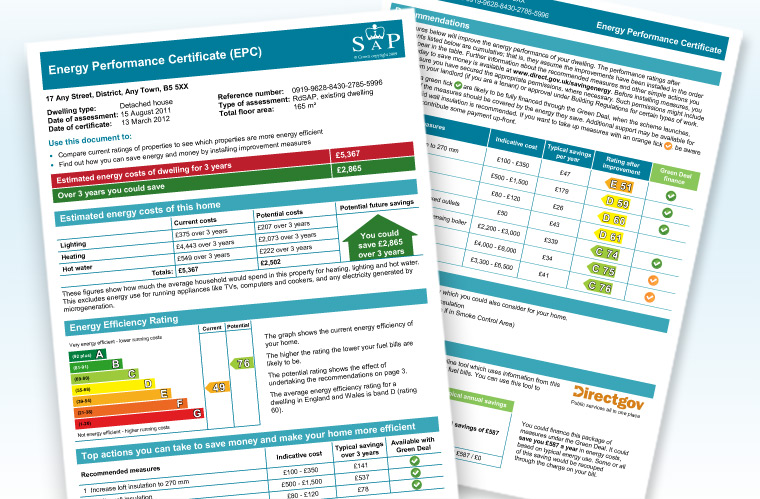What is an EPC rating?
An Energy Performance Certificate (EPC) is an Energy Performance Rating (EPR) carried out by an authorised assessor to determine the energy efficiency of a property. An EPC is issued after an assessment which grades a property on its energy efficiency on a scale between A – G. Properties that are more efficient are graded an A and properties that are highly inefficient can be graded as low as a G. The average rating for a property in the UK is between a D-E banding grade.
An EPC has become a mandatory requirement for all privately owned properties since 2018 when the minimum energy efficiency standards (MEES) were introduced. EPC certificates show the current rating of a property and the potential rating of a property, should the areas noted on the EPC be improved to achieve a higher degree of efficiency. An EPC will also show the amount of CO2 the property emits in tonnes and advise the amount this could be reduced by.
What does an EPC look like?

What impact does an EPC have?
All properties are required to have a minimum rating of at least an E before they’re sold or let. If a property is sold or let that doesn’t meet the minimum requirements, fines of up to £5,000 for a domestic dwelling and up to £150,000 for commercial premises are applicable. The EPC and MEES legislation applies to both domestic and commercial premises, with a few exemptions such as:
- Listed buildings
- Places of worship
- Temporary building that will be used for less than 2-years
- Stand-alone buildings with a total useful floor space of less than 50 square meters
- Industrial sites, workshops and non-residential agriculture buildings
- Some building that are due to be demolished
- Holiday accommodation that is let out for less than 4-months a year
- Residential buildings that are intended for use less than 4-months a year
Elements that make up an energy efficiency rating
Double Glazing – Upgrading your windows and doors improves the efficiency of your house, reducing heat loss through the glass. Upgrading to double glazed windows also has the added benefit of reducing noise.
Loft Insulation – A relatively quick, easy and cost-effective method of improving your properties EPR, loft installation can make a significant and immediate difference to your energy bills.
Wall Insulation – Depending on whether your home has a cavity or solid walls, insulting them can improve the EPR of your property and help improve the grading of your EPC.
Replace your boiler – The type of boiler installed in the property can impact the EPR. Installing a newer, more efficient boiler can improve the property rating grading on an EPC. Alternative heating solutions include:
- Air source heat pumps
- Ground source heat pumps
- Hybrid heat pumps
Secondary heating source – Installing an efficient secondary heating source can help improve your EPR. A secondary heating source can include several things, including:
- Wood-burning stove
- Solar panels (thermal or PV)
- Underfloor heating
Conducting an EPC rating
An energy assessor will arrive at the pre-book appointment day/time to carry out the assessment. The assessor will need access to all areas of the property to carry out all the relevant checks are mentioned above. The survey is only a visual inspection and will not be invasive, meaning no drilling or samples are required. The assessor may need to take several photographs of key areas that will be in the survey. The amount of time a survey can take will vary from property to property, but an advisor will be able to let you know based on the size of your home.
